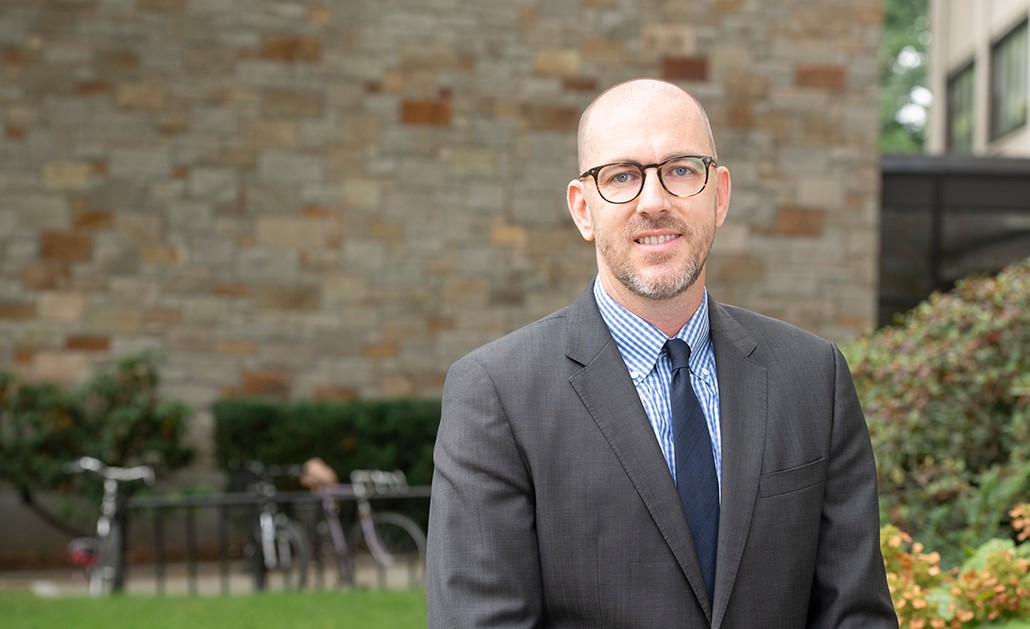
Photo by iStock.
How do rates of exposure to police violence that is perceived to be motivated by racism vary across the gender, ethnicity, and birthplace of young Black and Latinx people living in the United States?
Researchers in the Boston College School of Social Work have received a two-year, $395,000 grant from the Robert Wood Johnson Foundation’s Evidence for Action program to find out.
Robert O. Motley Jr. and Christopher Salas-Wright will interview and survey a total of more than 1,000 Black and Latinx people aged 18 to 29, asking how often they have experienced police violence, witnessed police violence in person, and watched video of police violence in the media.
What they find will build on Motley’s study of more than 300 Black college students in St. Louis, which revealed that the mental health of young Black people plummets when they are exposed to racism-based police violence.
“We’re trying to expand the measure that I developed not only to see if it’s valid for a larger sample of Black emerging adults, but also to see if it’s valid for Latinx emerging adults,” said Motley, an assistant professor who directs the Racism-based Violence Injury and Prevention Lab.
Most studies that look at police violence that is thought to be motivated by racism view Black and Latinx people as monolithic groups, Motley said. But his study with Salas-Wright will look at subgroups of young Latinx adults, including those who identify as Mexican, Central American, South American, and Caribbean, to pinpoint who is being most affected by racism in policing.

Robert O. Motley Jr. Photo by Caitlin Cunningham, BC photography.
The researchers have already prepared dozens of questions for the interviews, which will be conducted with 50 young Black and Latinx adults in Boston, St. Louis, Miami, and Orlando. Here’s a sample of what they plan to ask: “How often have you called the police for help only for officers to show up and treat you like you were a criminal?” “How often have you been pulled over for a traffic violation even though you weren’t doing anything illegal?” And “How often have you noticed that people killed by police in videos that you watch online are the same ethnicity as you?”
Motley and Salas-Wright hope that their study will show that their novel research tool can accurately assess exposure to racism-based police violence among young Black and Latinx adults. They want mental health professionals and social scientists to use the tool, which, they say, could help improve the accountability of police.
“Our hope is that this research will provide not only an important scientific contribution, but also directly inform the work of mental health and law enforcement professionals nationwide,” said Salas-Wright, a professor who studies the social, cultural, and economic challenges facing immigrants. “At the individual level, our measure can help mental health professionals to assess exposure to perceived racism-based police violence, which we expect to have important clinical implications. And, at the level of policy, it can help us to monitor and respond to trends in local communities and across the United States.”
Motley and Salas-Wright have developed a robust strategy to disseminate the results of their study. First of all, they plan to host events to share their findings with mental health practitioners at colleges and community-based organizations that work with young adults. Motley said they want to show clinicians how to use the tool and explain why they should incorporate it into their assessments of trauma.

Christopher Salas-Wright. Photo by Peter Julian.
The researchers have also teamed up with Strategies for Youth, a local nonprofit that trains police and young people to improve their interactions with each other. Motley said SFY will incorporate the findings into their training programs and then bring in the researchers to meet with law enforcement officers to go over the changes.
He described the endgame by posing a question: “How do we make sure that the police are aware of how emerging adults are perceiving them when they’re engaging with them?”
On campus, Motley and Salas-Wright have formed partnerships with the school’s Black and Latinx Leadership Initiatives—cohort-based programs that help students develop a more nuanced understanding of the challenges facing these specific populations. In particular, they will work with students in the programs to make videos that highlight the study’s findings and encourage social media outlets to post content warnings and crisis hotline numbers on all videos that show police violence.
The duo plan to post the videos to the social media accounts for Motley’s lab and connect with decision-makers at Facebook, YouTube, TikTok, and Instagram to discuss the need to include content warnings and hotline numbers. “Research shows that people who have been exposed to these videos often have to turn off their computer because they were crying or frightened,” Motley said. “There should be some type of warning message saying, ‘Hey, if you’re feeling any type of stress or feeling down about what you’ve seen, call this hotline where you can get some assistance and talk to someone about it.’”


